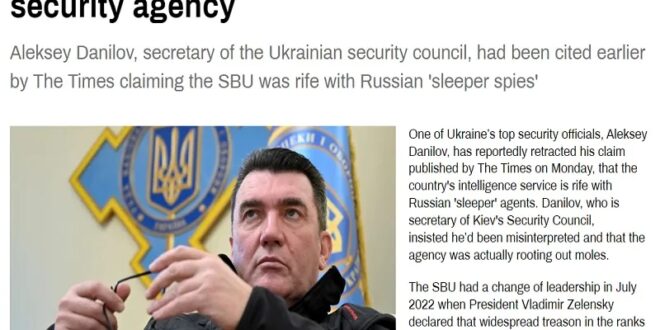Zelensky himself set this divisive process into motion by recently warning that Russian agents are supposedly plotting to carry out a “Maidan 3” against him.
Ukrainian National Security Council chief Alexey Danilov claimed that the Times of London misinterpreted his words when they quoted him as saying that the secret police (SBU) are still supposedly rife with Russian spies. It’s extremely unlikely that a newspaper of record such as this one would do that, however, especially about a subject as sensitive as this one. For that reason, it was probably the case that he was forced by the SBU to retract his statement under pressure from them.
It’s understandable why the SBU would be upset after they wrote that “Oleksiy Danilov said in an interview with The Times that dormant Russian agents embedded in public institutions including the SBU, Ukraine’s domestic security service, were being ordered to undermine the country’s unity.” To that end, he told them that this spy network was trying to widen political-military divisions and stir up protests, and he blamed the SBU’s continued infiltration on the legacy of former President Yanukovich.
Danilov’s scandalous claims were made as “NATO’s Proxy War On Russia Through Ukraine Appears To Be Winding Down” and amidst the spiraling rivalry between Zelensky and his Commander-in-Chief Valery Zaluzhny. It was arguably with a view towards preemptively discrediting genuinely grassroots protests against him, irrespective of whether his newfound military rival plays a role in orchestrating them, that the Ukrainian leader recently alleged that Russia is plotting a so-called “Maidan 3”.
Objectively speaking, it’s difficult to believe that Russia still retains the influence required to carry out such a regime change after the SBU’s 21-month-long nationwide counterintelligence operation, hence why it’s more likely that Zelensky just wanted to concoct a pretext for cracking down on state dissidents. Nevertheless, the signal that he unwittingly sent apparently made Danilov think that he should roll with this new information warfare narrative in solidarity with his boss, thus explaining his initial remarks.
By doing so, he actually ended up stoking the same internal divisions that he ironically claimed that Russia was trying to widen, which the SBU obviously realized and that’s the reason that they presumably pressured him to retract his statement right away. Extrapolating from this sequence of events, it seems that serious paranoia is once again beginning to take hold of security officials in Kiev, which was due in no small part to Zelensky himself warning about a “Maidan 3” for purely self-interested political reasons.
His desperation to save his own skin did what no “Russian agents” were hitherto able to accomplish, namely exacerbate domestic divisions at the most sensitive moment in the conflict thus far after the failure of this summer’s counteroffensive led to everything falling apart behind the Ukrainian frontlines. The economy, finances, foreign military aid, logistics, and morale have all plummeted at precisely the same time and served to widen preexisting civil-state and military-political fault lines.
Prior to Zelensky unveiling his conspiracy theory about Russian agents still supposedly operating inside Ukraine and continuing to pose a credible regime change threat in spite of the SBU’s protracted counterintelligence operation, Kiev played these problems off as being the result of natural processes. That was admittedly an accurate assessment, but now security officials are once again super paranoid after their head of state unexpectedly suggested that this is actually all the work of Russian agents.
The SBU felt offended after all they’d done to root out such networks over the past 21 months, while their institutional rivals began wondering whether the secret police might really still be infiltrated by the enemy, so much so that perhaps the Kremlin is now using them as cover for a “Maidan 3” scenario. Danilov then inadvertently extended credence to this divisive speculation that Zelensky himself was the first to introduce into the national discourse by explicitly claiming that the SBU is indeed still infiltrated.
From the secret police’s perspective, his rhetoric could serve to fuel their rivals’ efforts to sideline them at this sensitive moment in the conflict, which could potentially be exploited by Zaluzhny and his “fellow travelers” inside the state bureaucracy to carry out a power play against Zelensky. The SBU might also suspect that Danilov could be in on this speculative plot too and meant to discredit them this whole time but is only now retracting his statement because they put immense pressure upon him to do so.
It’s at moments like this that all states are supposed to remain united, yet it was none other than the head of state himself that set into motion the process that’s now tearing the state apart at the seams by pitting its security officials against once another out of paranoia that their rivals might be Russian agents. Nobody can confidently predict what comes next, but there’s no doubt that Zelensky dealt a powerful blow to “deep state” unity that’ll be very difficult for Ukraine to recover from anytime soon, if at all.
 Eurasia Press & News
Eurasia Press & News




